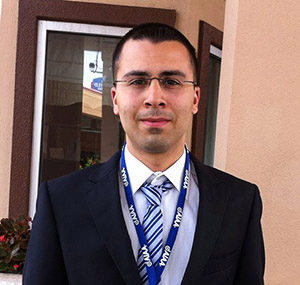 |
| Petro J. Milan |
A two-week supercomputer boot camp organized by Argonne National Lab is widening the research ambitions of AE doctoral student Petro Junior Milan.
Milan was one of about 70 high-achieving academics, researchers, and scientists selected to attend the 2019 Argonne Training Program on Extreme-Scale Computing (ATPESC), an annual event sponsored by the U.S. Department of Energy’s (DOE) Argonne National Laboratory and funded by DOE’s Exascale Computing Project (ECP). It is designed to impart key skills and tools that participants can use to design and implement large-scale algorithms on current supercomputers and the leadership-class computing systems of the future.
A doctoral student of AE professor Vigor Yang (and a CSE master's student), Milan attended the training so that he will be able to better utilize the rapidly expanding capabilities in high performance computing (HPC) to simulate turbulent reacting flows in liquid rocket engines.
"Right now, with the computing capacity we have, we can't simulate a full scale rocket engine, because there are limits on the calculations we can perform. The simulations we can perform take months to complete, which is very expensive," Milan noted.
"With the exascale computing capabilities that are coming, we'll be able to do quintillion of calculations per second, which will make it a lot less expensive, but, to use them, we need to restyle our codes."
Milan said the workshop will help him to port a legacy multiphysics computational fluid dynamics (CFD) code, previously developed at Yang's group, to graphics processing units (GPUs) to run on the world's most powerful supercomputers.
"Ultimately, we want to see researchers looking at data analytics, machine learning, artificial intelligence, and HPC to drive innovation in my research area," Milan said.
His advisor, Yang, concurred with this assessment, adding, "The work that Petro has been pursuing represents a big part of the future in our field. His research is fascinating."
Now in it's seventh year, the summer workshop has trained more than 500 computer scientists and graduate students in the HPC tools needed to advance science in the emerging exascale era.
"The HPC capacities that are coming on line now, and in the next few years, will be so formidable, so powerful, that physicists will be able to tackle big challenges like simulating the origins of the universe," Milan said. "We just want to see what's going on inside a rocket engine."